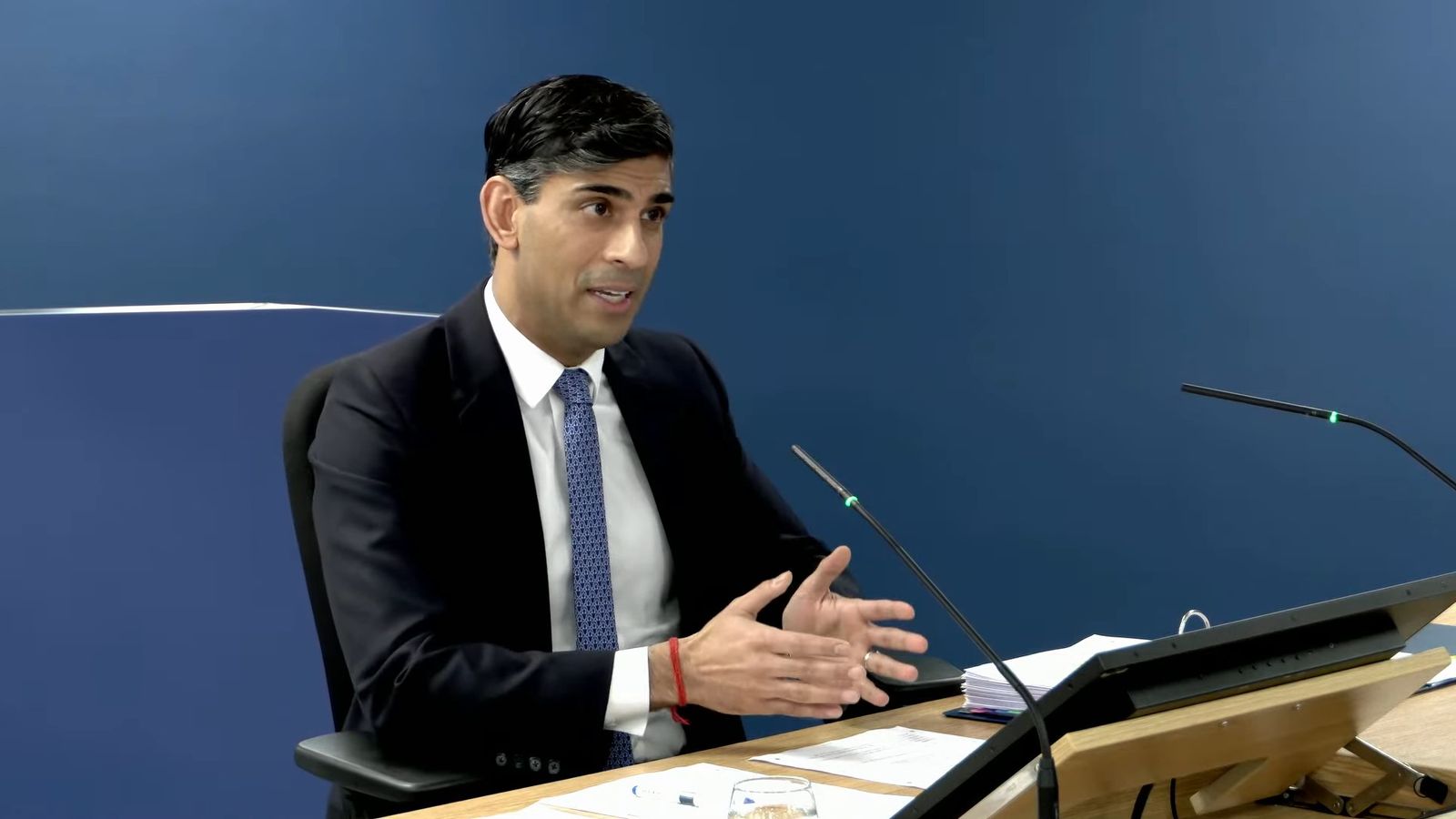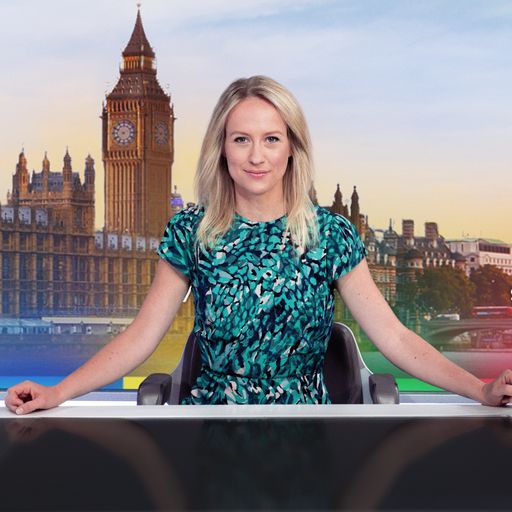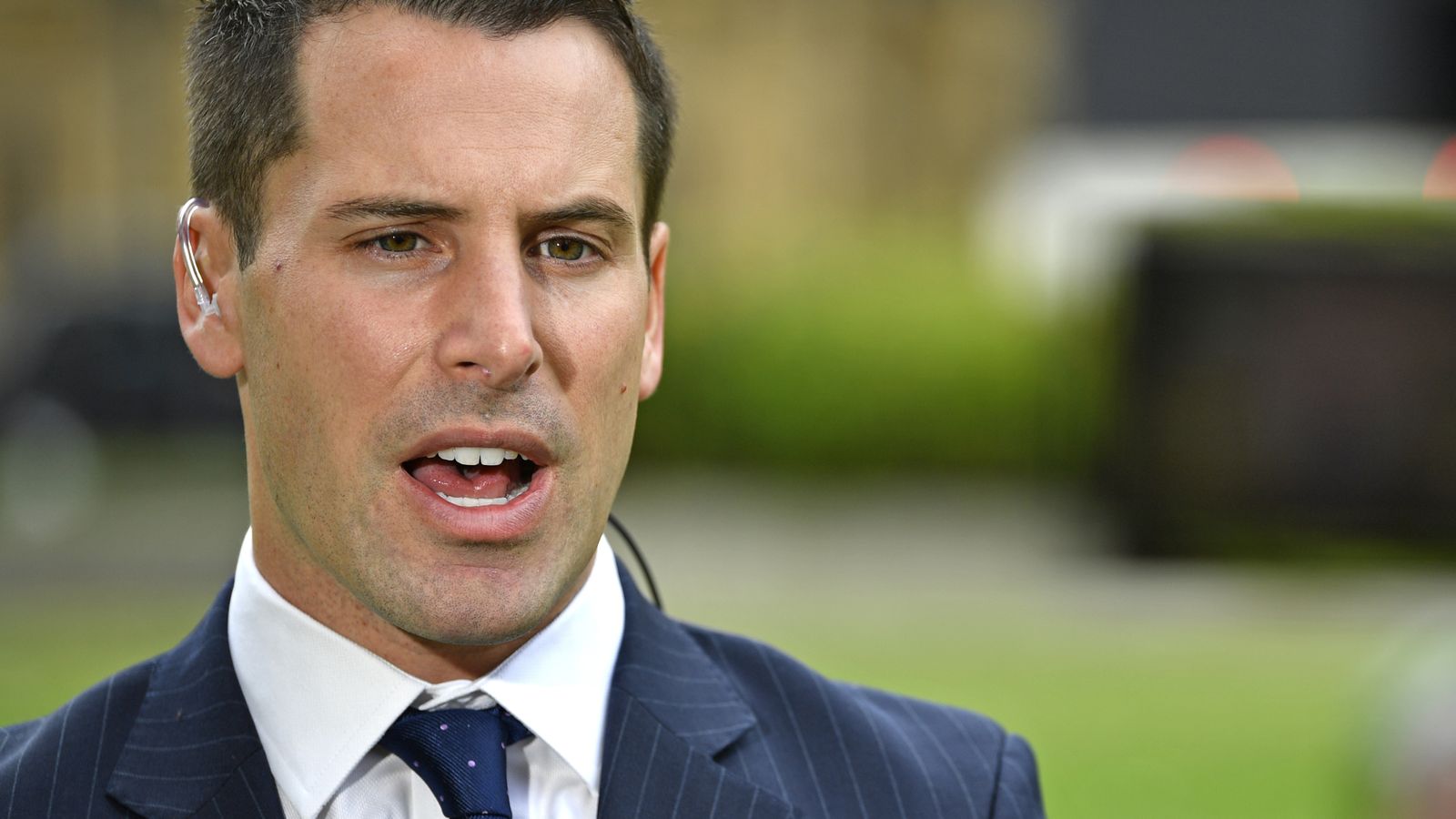COVID inquiry: Rishi Sunak says advisers had ‘ample opportunity’ to raise concerns over Eat Out – Sunak


Medical advisers were not consulted about the Eat Out to Help Out scheme as it was deemed a “micro” policy, according to Rishi Sunak.
The prime minister is appearing before the UK’s COVID inquiry, as part of its module on governmental decision-making in the pandemic.
He is giving evidence about his time as chancellor.
Politics latest: Sunak facing COVID inquiry after ‘Dr Death’ claim
Sky News Monday to Thursday at 7pm.
Watch live on Sky channel 501, Freeview 233, Virgin 602, the Sky News website and app or YouTube.
The scheme was introduced on August 3 2020 – at the end of the first COVID lockdown – to provide discounts of up to 50% off the cost of food and alcoholic drinks at relevant restaurants, cafes and pubs from Monday to Wednesday – until August 31.
In October, the inquiry heard how one scientific adviser branded Mr Sunak “Dr Death” over the scheme.
Hugo Keith KC, the counsel for the inquiry, asked Mr Sunak about the process leading to the formation of the policy.
The prime minister said it was designed in the context of indoor hospitality already being opened – which he said was already announced – and including mitigating factors like one-way systems, contactless payments and one metre distancing.
He said Eat Out was a “micro policy” that would not require extra modelling, and was about encouraging people to use restaurants that were already deemed safe.
Advertisement
Mr Sunak said: “It was done very much in that context and in the same way that other economic decisions like a VAT cut for hospitality or a stamp duty card or indeed furlough or anything else or grants for the hospitality industry wouldn’t ordinarily be cleared with medical advisers, nor was it because we had already made the collective decision to reopen indoor hospitality.”
The prime minister was asked why no questions about the policy were raised after it was first announced, having not consulted on it first with medical advisers.
Mr Sunak said it was the responsibility of scientific and medical advisers to raise their concerns about the policy if they had an issue with it – even if it had already been announced by the government.
Asked about the issues raised by Sir Chris Whitty, Sir Patrick Valance and others, Mr Sunak said: “The onus is surely on the people who now believe that it was a risk to have raised it at the time when something could have been done about it if they felt strongly.”
He said that other departments and the devolved administrations were not consulted on the scheme as it was market sensitive.
Mr Sunak added: “This was a very reasonable, sensible policy intervention to help safeguard those jobs in that safe reopening. That was my view.
“I didn’t believe that it was a risk. I believe it was the right thing to do.
“But if others are suggesting that they didn’t, they had ample opportunity to raise those concerns in forums where I was there, or where the Prime Minister or others were, and they didn’t.
Read more:
Johnson was known as a ‘trolley’ because he would change direction
Key moments of Johnson’s inquiry evidence
Sticking to his guns, and firmly.
It’s the first time the prime minister has appeared passionate in his evidence to the inquiry thus far.
And – he’s standing by his flagship Eat Out to Help Out scheme, saying his “primary concern was protecting millions of jobs”.
The scheme – which cost the Treasury £840m, and saw meals subsidised in restaurants for nearly a month in August 2020 – was aimed at supporting the hospitality industry.
Rishi Sunak described it as a “micro policy” designed specifically in the context or already agreed and safe measures.
But, he went one step further when asked why he didn’t consult with science advisors, saying the onus was on the chief medical officer and the then chief scientific adviser to raise concerns in subsequent meetings which they didn’t.
He was pushed again why he didn’t tell the secretary for health about the scheme, to which he responded he wouldn’t consult on other fiscal measures such as raising VAT.
Apology
The prime minister began his evidence by apologising.
“I just wanted to start by saying how deeply sorry I am to all of those who lost loved ones, family members, through the pandemic,” he said.
“And also all those who suffered in various different ways throughout the pandemic and as a result of the actions that were taken.”
Mr Keith and Mr Sunak spent much of the morning going through how choices were made in government.
Mr Sunak emphasised that it was Boris Johnson – as prime minister – who was ultimately responsible for making choices about the UK’s direction, and he would give input about the economy as chancellor.
Speaking about the government’s changing of course in the lead-up to the first lockdown, Mr Sunak said public health considerations were of primary concern, and that Mr Johnson acted largely on advice from SAGE (Scientific Advisory Group for Emergencies) – which itself would change.
The-then chancellor said he did not feel shut out and had adequate access to Mr Johnson.
WhatsApp messages
At the start of his evidence, the prime minister had to defend the fact he was unable to supply any of his WhatsApp messages from the pandemic to the inquiry.
The prime minister said he had changed phones numerous times since the pandemic began, and the messages had not moved between his devices.
Mr Keith raised an article in The Spectator magazine, published last year, in which Mr Sunak was interviewed. This article suggested Mr Sunak privately lobbied Mr Johnson and tried not to “leave a paper trail”.
Click to subscribe to Politics at Jack and Sam’s wherever you get your podcasts
Mr Sunak said he would write to Mr Johnson when necessary – and as neighbours they would regularly speak informally, for example when they were in the garden of Downing Street with their families.
He added that he saw Mr Johnson more than his wife in the early days of COVID due to the length of time spent working.

